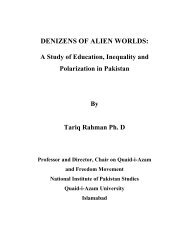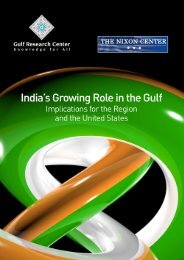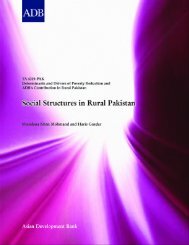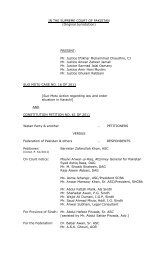- Page 2: A Brief History of Saudi Arabia Sec
- Page 8: A Brief History of Saudi Arabia, Se
- Page 12: Appendixes 1 Glossary 317 2 Basic F
- Page 16: Tanker with first shipment of Saudi
- Page 20: Foreword Saudi Arabia is a country
- Page 26: Laden to attack the United States.
- Page 30: ACKNOWLEDGMENTS T he author is deep
- Page 34: Note On Arabic Transliteration and
- Page 38: introduction Yet one cannot underst
- Page 44: A BRIEF HISTORY OF SAUDI ARABIA The
- Page 48: A Brief History of Saudi Arabia abo
- Page 52: A Brief History of Saudi Arabia Mos
- Page 56: A Brief History of Saudi Arabia Pet
- Page 60: A Brief History of Saudi Arabia Dil
- Page 64: A Brief History of Saudi Arabia and
- Page 68: A Brief History of Saudi Arabia In
- Page 72: A Brief History of Saudi Arabia con
- Page 76:
A Brief History of Saudi Arabia set
- Page 80:
Poetry Poetry was Arabia’s princi
- Page 84:
A Brief History of Saudi Arabia and
- Page 88:
2 The Birth of Islam (571-632) At t
- Page 92:
A Brief History of Saudi Arabia The
- Page 96:
A Brief History of Saudi Arabia The
- Page 100:
A Brief History of Saudi Arabia The
- Page 104:
A Brief History of Saudi Arabia mid
- Page 108:
A Brief History of Saudi Arabia The
- Page 112:
A Brief History of Saudi Arabia Mec
- Page 116:
A Brief History of Saudi Arabia Thu
- Page 120:
A Brief History of Saudi Arabia As
- Page 124:
A Brief History of Saudi Arabia Had
- Page 128:
A Brief History of Saudi Arabia Muh
- Page 132:
A Brief History of Saudi Arabia the
- Page 136:
A Brief History of Saudi Arabia Muh
- Page 140:
A Brief History of Saudi Arabia pol
- Page 144:
A Brief History of Saudi Arabia wou
- Page 148:
A Brief History of Saudi Arabia The
- Page 152:
A Brief History of Saudi Arabia nam
- Page 156:
A Brief History of Saudi Arabia Aft
- Page 160:
A Brief History of Saudi Arabia of
- Page 164:
A Brief History of Saudi Arabia Sun
- Page 168:
A Brief History of Saudi Arabia Sun
- Page 172:
A Brief History of Saudi Arabia The
- Page 176:
A Brief History of Saudi Arabia reg
- Page 180:
A Brief History of Saudi Arabia The
- Page 184:
A Brief History of Saudi Arabia (Ch
- Page 188:
A Brief History of Saudi Arabia of
- Page 192:
A Brief History of Saudi Arabia the
- Page 196:
A Brief History of Saudi Arabia The
- Page 200:
A Brief History of Saudi Arabia ana
- Page 204:
A Brief History of Saudi Arabia As
- Page 208:
A Brief History of Saudi Arabia Lan
- Page 212:
A Brief History of Saudi Arabia cla
- Page 216:
A Brief History of Saudi Arabia the
- Page 220:
A Brief History of Saudi Arabia bet
- Page 224:
A Brief History of Saudi Arabia of
- Page 228:
A Brief History of Saudi Arabia By
- Page 232:
A Brief History of Saudi Arabia Sea
- Page 236:
A Brief History of Saudi Arabia For
- Page 240:
A Brief History of Saudi Arabia In
- Page 244:
By the mid-16th century, Ottoman co
- Page 248:
A Brief History of Saudi Arabia mou
- Page 252:
A Brief History of Saudi Arabia chr
- Page 256:
A Brief History of Saudi Arabia Mua
- Page 260:
A Brief History of Saudi Arabia oth
- Page 264:
A Brief History of Saudi Arabia The
- Page 268:
A Brief History of Saudi Arabia the
- Page 272:
A Brief History of Saudi Arabia rel
- Page 276:
A Brief History of Saudi Arabia Wah
- Page 280:
A Brief History of Saudi Arabia the
- Page 284:
A Brief History of Saudi Arabia hom
- Page 288:
A Brief History of Saudi Arabia nex
- Page 292:
A Brief History of Saudi Arabia Bar
- Page 296:
A Brief History of Saudi Arabia Tit
- Page 300:
A Brief History of Saudi Arabia The
- Page 304:
A Brief History of Saudi Arabia Fra
- Page 308:
A Brief History of Saudi Arabia Sau
- Page 312:
A Brief History of Saudi Arabia at
- Page 316:
A Brief History of Saudi Arabia rev
- Page 320:
A Brief History of Saudi Arabia in
- Page 324:
A Brief History of Saudi Arabia The
- Page 328:
A Brief History of Saudi Arabia Fol
- Page 332:
A Brief History of Saudi Arabia Dir
- Page 336:
A Brief History of Saudi Arabia The
- Page 340:
A Brief History of Saudi Arabia nec
- Page 344:
A Brief History of Saudi Arabia Ana
- Page 348:
A Brief History of Saudi Arabia Fai
- Page 352:
A Brief History of Saudi Arabia A D
- Page 356:
A Brief History of Saudi Arabia The
- Page 360:
A Brief History of Saudi Arabia dea
- Page 364:
A Brief History of Saudi Arabia The
- Page 368:
8 Unity and Independence (1891-1932
- Page 372:
A Brief History of Saudi Arabia of
- Page 376:
A Brief History of Saudi Arabia The
- Page 380:
A Brief History of Saudi Arabia onl
- Page 384:
A Brief History of Saudi Arabia Und
- Page 388:
A Brief History of Saudi Arabia the
- Page 392:
A Brief History of Saudi Arabia Sir
- Page 396:
A Brief History of Saudi Arabia The
- Page 400:
A Brief History of Saudi Arabia bat
- Page 404:
A Brief History of Saudi Arabia wit
- Page 408:
A Brief History of Saudi Arabia Adm
- Page 412:
A Brief History of Saudi Arabia For
- Page 416:
A Brief History of Saudi Arabia com
- Page 420:
A Brief History of Saudi Arabia An
- Page 424:
A Brief History of Saudi Arabia In
- Page 428:
A Brief History of Saudi Arabia The
- Page 432:
A Brief History of Saudi Arabia Tie
- Page 436:
A Brief History of Saudi Arabia In
- Page 440:
A Brief History of Saudi Arabia wel
- Page 444:
A Brief History of Saudi Arabia Exp
- Page 448:
A Brief History of Saudi Arabia 77
- Page 452:
A Brief History of Saudi Arabia dol
- Page 456:
10 A Path to World Power (1953-1973
- Page 460:
A Brief History of Saudi Arabia Kin
- Page 464:
A Brief History of Saudi Arabia of
- Page 468:
A Brief History of Saudi Arabia occ
- Page 472:
A Brief History of Saudi Arabia and
- Page 476:
A Brief History of Saudi Arabia adv
- Page 480:
A Brief History of Saudi Arabia As
- Page 484:
A Brief History of Saudi Arabia ref
- Page 488:
A Brief History of Saudi Arabia End
- Page 492:
A Brief History of Saudi Arabia tel
- Page 496:
A Brief History of Saudi Arabia Sau
- Page 500:
A Brief History of Saudi Arabia con
- Page 504:
A Brief History of Saudi Arabia on
- Page 508:
A Brief History of Saudi Arabia emb
- Page 512:
A Brief History of Saudi Arabia beg
- Page 516:
A Brief History of Saudi Arabia vic
- Page 520:
A Brief History of Saudi Arabia fam
- Page 524:
A Brief History of Saudi Arabia stu
- Page 528:
A Brief History of Saudi Arabia hel
- Page 532:
A Brief History of Saudi Arabia The
- Page 536:
A Brief History of Saudi Arabia The
- Page 540:
A Brief History of Saudi Arabia com
- Page 544:
A Brief History of Saudi Arabia Pub
- Page 548:
12 The Gulf Crisis and Its Aftermat
- Page 552:
A Brief History of Saudi Arabia The
- Page 556:
A Brief History of Saudi Arabia Ope
- Page 560:
A Brief History of Saudi Arabia pos
- Page 564:
A Brief History of Saudi Arabia (Va
- Page 568:
A Brief History of Saudi Arabia Yet
- Page 572:
A Brief History of Saudi Arabia a c
- Page 576:
A Brief History of Saudi Arabia whi
- Page 580:
A Brief History of Saudi Arabia ass
- Page 584:
A Brief History of Saudi Arabia Ara
- Page 588:
A Brief History of Saudi Arabia As
- Page 592:
A Brief History of Saudi Arabia Abd
- Page 596:
A Brief History of Saudi Arabia In
- Page 600:
A Brief History of Saudi Arabia Fin
- Page 604:
A Brief History of Saudi Arabia to
- Page 608:
A Brief History of Saudi Arabia mov
- Page 612:
A Brief History of Saudi Arabia an
- Page 616:
A Brief History of Saudi Arabia pre
- Page 620:
A Brief History of Saudi Arabia int
- Page 624:
A Brief History of Saudi Arabia The
- Page 628:
A Brief History of Saudi Arabia and
- Page 632:
A Brief History of Saudi Arabia Edu
- Page 636:
A Brief History of Saudi Arabia (co
- Page 640:
A Brief History of Saudi Arabia com
- Page 644:
A Brief History of Saudi Arabia dol
- Page 648:
A Brief History of Saudi Arabia to
- Page 652:
A Brief History of Saudi Arabia Usi
- Page 656:
A Brief History of Saudi Arabia Sta
- Page 660:
A Brief History of Saudi Arabia Wom
- Page 664:
A Brief History of Saudi Arabia Wes
- Page 668:
A Brief History of Saudi Arabia fac
- Page 672:
A Brief History of Saudi Arabia con
- Page 676:
A Brief History of Saudi Arabia haj
- Page 680:
A Brief History of Saudi Arabia obs
- Page 684:
A Brief History of Saudi Arabia of
- Page 688:
A Brief History of Saudi Arabia Ser
- Page 692:
A Brief History of Saudi Arabia 622
- Page 696:
A Brief History of Saudi Arabia 177
- Page 700:
A Brief History of Saudi Arabia Bir
- Page 704:
A Brief History of Saudi Arabia 198
- Page 708:
A Brief History of Saudi Arabia Jun
- Page 712:
A Brief History of Saudi Arabia Bli
- Page 716:
A Brief History of Saudi Arabia Ibr
- Page 720:
A Brief History of Saudi Arabia Ras
- Page 724:
Appendix 5 Suggested Reading Arabia
- Page 728:
A Brief History of Saudi Arabia Uni
- Page 734:
Index Note: Boldface page numbers i
- Page 738:
index Wahhabi allegiance in 134-135
- Page 742:
index customary law 183 customs uni
- Page 746:
index reforms under King Fahd 261-2
- Page 750:
Hadith as source of 35 introduced i
- Page 754:
index ministries 184, 205-206, 209,
- Page 758:
index Palestine Liberation Organiza
- Page 762:
index death of 227 foreign relation
- Page 766:
tribes 19 and career advancement 21












